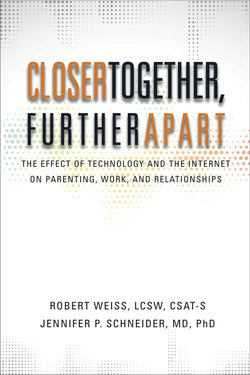Читать книгу Closer Together, Further Apart: The Effect of Technology and the Internet on Parenting, Work, and Relationships - Jennifer Schneider - Страница 3
На сайте Литреса книга снята с продажи.
PREFACE
ОглавлениеThe original intent of writing Closer Together, Further Apart was to explore the problems that digital technology appeared to be having on our relationships, especially our intimate ones. We were motivated to write this based on the outpouring of media reports on how technology is overrunning and ruining Western culture, along with “cocktail party conversations” where we heard much of the same. Curiously, as our research deepened our book premise quickly morphed into a much broader and more balanced analysis of the effects of digital technology on our daily lives.
We made some unanticipated discoveries along the way, and we expect that you will too. Here are just a few things we learned:
•Digital devices of today are just another part of the human/technological evolution—much like the invention of the wheel, printing press, the light bulb, and the splitting of atoms.
•Today’s generation gap is different than any other generation gap we’ve seen because generations are not having conversations in the same way. Much of modern culture is embroiled in a profound, yet mostly unseen generation gap. The digital world has shifted how we communicate and share opinions. People of all ages are often literally separated by the very tools they use to communicate. Younger people live in a more digital and social media based environment while older adults increasingly report feeling left behind.
•The escalation of addictive behaviors has been and always will be driven by technological advances. Most people are able to appreciate more immediate, escalated pleasures that technology provides us. A small sector of the population, typically the most emotionally vulnerable, will end up addicted.
•Humans are readily adaptable to change. That being said, some tend to adapt better or faster than others; those others will struggle and may even choose to ignore or rebel against change. When people don’t have the courage to change, the result could be that they are left out of the relationships that they care about the most.
•The brains of our children are now evolving in sync with digital technology. Their brains have changed because of the electronic devices we have been placing into their hands at increasingly earlier stages of their development. The generation growing up now will differ from their parents more completely than any previous generation.
Our hope is that this book will be an eye opener, especially for skeptics who view the Internet, digital technology, and the rise of social media as signs pointing toward the inevitable decline of humanity and our culture. We believe Closer Together, Further Apart will be a great place for people from different generations to begin a nuanced, meaningful conversation that can help close that growing “generation gap.” To help with this, we created a Reading Group Guide to get that conversation started. A glossary of terms is also available to get you up to speed on the latest tech terminology.
As you read this book, we invite you to personally explore how your relationships with others and with your sense of time, priority, and place have changed as a result of digital technology. Technology changes so rapidly that it’s hard to keep up. We’ll start out by looking at where it all began.
